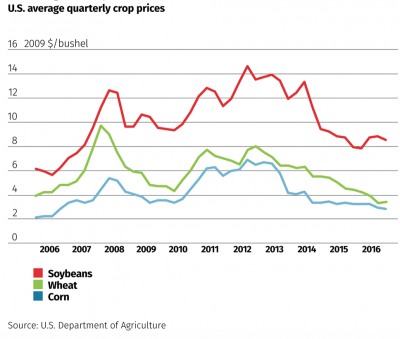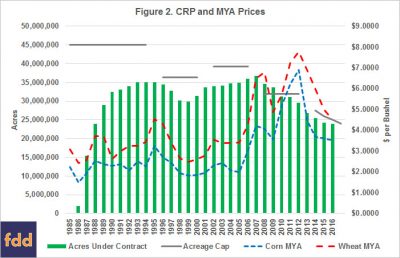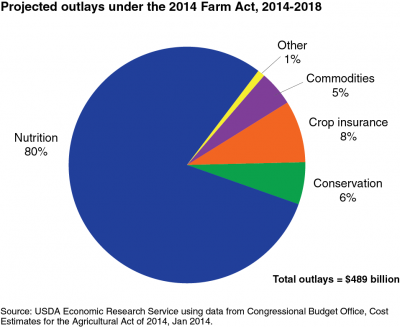The Agriculture Department has finalized some revisions to two major farm commodity programs, including rules for adding new base acres, but signup for the programs won’t be scheduled until after…
Senate Ag Committee Holds Second Farm Bill Hearing
The Senate Ag Committee held its second Farm Bill hearing on Saturday in Frankenmuth, Michigan. Chairman Pat Roberts (R., Kans.) pointed out that, unlike when the last Farm Bill was drafted, the U.S. agricultural economy is struggling right now. At a press briefing at the conclusion of the hearing, he indicated that trade was an important variable in assisting with the current low price environment. A variety of important issues were discussed by witnesses on Saturday, in two separate panels; today’s update highlights remarks that were made on trade, crop insurance, the Conservation Reserve Program, the dairy program, and the SNAP program.
Recall that the Senate Ag Committee of the 115th Congress convened its first Farm Bill discussion back in February in Manhattan, Kansas, while the House Ag Committee has conducted full Committee and Subcommittee hearings over the past few months on a variety of issues including: the farm economy; conservation; rural development and energy programs; specialty crops; livestock and dairy issues; farm policy and farm credit, and cotton.
In his opening statement on Saturday, Chairman Roberts indicated that, “All of agriculture is struggling, not just one or two commodities. During the last Farm Bill debate, the agriculture sector enjoyed high prices. Now, we face multiple years of low prices, across the board.”

Ranking Member Debbie Stabenow (D., Mich.) pointed out in her opening remarks that, “Going into the 2018 Farm Bill, we know things have changed over the past few years. Low prices have pinched margins and made it tough for many producers to make ends meet.
“Right off the bat, we know we need to strengthen our farm safety net – particularly for our dairy farmers.”
Full panel, nearly full room for #FarmBill18 hearing. pic.twitter.com/e0IUtRH9uF
— BethStuever (@BethStuever) May 6, 2017
Janna Fritz, who is part of a Michigan family farm that produces corn and soybeans, and who also serves as the Secretary/Treasurer of the Michigan Corn Growers Association (MCGA), explained on Saturday that, “Corn farmers have seen a drastic drop in corn prices over the past several years, and many farmers are now experiencing corn prices that are at or below their cost of production.”
“The combination of crop insurance and the commodity safety net through the Agricultural Risk Coverage – County Level and Price Loss Coverage programs have been helpful in offsetting significant revenue losses in recent years,” she added.
Ms. Fritz also stated that, “Along with a strong safety net, we also want to push for market development that will increase demand for corn and corn products. In that vein, trade and export development are consistently ranked as a top priority by MCGA members. As this committee knows, agricultural exports account for close to 30 percent of incomes for U.S. corn farmers.”
Chris Alpers, a third generation Michigan apple and cherry grower, also pointed to the importance of trade at Saturday’s hearing, noting that, “I would like to take this opportunity to talk about the immense importance of protecting provisions for agriculture in NAFTA. Mexico and Canada represent the two largest export markets for apples, totaling more than $450 million in sales last year. Disruption to these important markets would have a devastating impact on the entire industry.”
Mr. Alpers pointed out that, “Modern apple plantings cost upwards of $40,000/ac before a single apple is harvested (5-7 years later). This enormous startup cost unfortunately scares many talented young entrepreneurs (and lending institutions) away from investing their talents (and capital) into apple production. I am thankful many producers (and lenders) recognize crop insurance as an important risk management tool. Without the ability to purchase a solid insurance policy and limit my exposure I would not be able to justify investing my future into the apple business.”
The Conservation Reserve Program (CRP) was also discussed at the Farm Bill hearing. Fifth generation farmer David Williams, who grows corn, soybeans and wheat, presented testimony on behalf of the Michigan Soybean Association and the American Soybean Association (ASA) and stated that, “Much of the discussion in farm policy circles right now centers on whether [CRP] acres should be increased and, if so, by how much? And should the parameters of the CRP program be changed by Congress? ASA voting delegates supported a new resolution at this year’s Commodity Classic to increase CRP acreage, though we did not take a position on how much, what kind, or how to pay for it.”
In 2016, the #ConservationReserveProgram covered 23.5 million acres of environmentally sensitive land in the US. https://t.co/SALdzR7oF0 pic.twitter.com/yij3EtYSoA
— USDA_ERS (@USDA_ERS) March 29, 2017
Kyle Rorah, who is a Policy Specialist with Ducks Unlimited (DU) testified that, “Hunters spend $4.8 billion a year in Michigan to pursue many of the species that rely on the type of habitat conserved by the CRP. , Lands enrolled in CRP help absorb farm field run-off before it hits the ditch or stream, help recharge groundwater resources, and help keeps the soil on the landscape. For these reasons DU is advocating for an increase to the current national CRP cap of 24 million acres, an increased allocation to CRP grasslands, and finally a robust voluntary incentive based working lands program, one that works hand-in-hand with private landowners.”
As an interesting side note, a recent farmdoc daily update by Jonathan Coppess explored the historical background of CRP. With respect to the CRP cap, Mr. Coppess explained that, “Congress has reauthorized CRP in each farm bill since 1985 and has expanded the program’s purposes. More notable is the fact that Congress has increased or decreased the program’s acreage cap in subsequent bills, coinciding with low or high crop prices (respectively). To illustrate this interaction between CRP and crop prices, Figure 2 [below] compares the CRP acreage cap, acres under contract and marketing year average prices for wheat and corn since the program was recreated in 1985.”

Meanwhile, support for dairy producers was another issue that was addressed at the hearing. A news release yesterday from the National Milk Producers Federation (NMPF) stated that, “Dairy farmers in Michigan and across the nation need federal lawmakers to revise the safety net created in the 2014 Farm Bill to provide them adequate risk management protection, according to a dairy farmer from eastern Michigan who testified in Frankenmuth on Saturday at a Senate hearing.
“Darrin Siemen of Harbor Beach, Mich., told a Senate Agriculture Committee field hearing held at the Saginaw Valley Research Center that the Margin Protection Program (MPP), created in the 2014 Farm Bill, ‘has failed to deliver the protection farmers need and expect. While MPP remains the right model for the future of our industry, changes are needed if Congress wants to prevent dairy farmers like me from going out of business,’ he said.”
The release indicated that, “Siemen said that the MPP is designed to help farmers insure against either low milk prices or high feed costs, but the way the program calculates the relative value of feeds such as corn, soybean meal and hay was ‘significantly changed’ as it was written into law. This change ‘fundamentally altered the safety net designed by NMPF and other dairy leaders around the country. Unfortunately, as a direct result of these changes, the MPP safety net has failed to deliver the protection farmers need and expect,’ he said.”
Ranking Member Stabenow remarked on the dairy program situation and indicated that (audio replay available here, MP3 90 seconds), “My staff and I came up with this idea, which is supported by the Farm Bureau, Farmers Union and [the] National Milk Producers, to really offer milk the opportunity to do what other commodities can do, which is to purchase crop insurance.
And so, we are working with the Secretary- expanding crop insurance, there is capacity to that administratively, through the Crop Insurance Board, and so we are working to see if we can get some help immediately this year to be able to do that.
During the second panel of the hearing, Faith Watson, who participates in the Supplemental Nutrition Assistance Program (SNAP), which represents a significant portion of Farm Bill spending, stated that, “There is definitely a lot of good the program does, but there is stigma about those who depend on SNAP benefits. There seems to be a pervasive stereotype about what kind of person uses SNAP – they’re lazy, don’t care, don’t work. But that’s just not me and it’s not the people that I know who have needed government assistance. We are hard workers who want a different future.”
Ms. Watson added that, “Another improvement could be to avoid reducing SNAP benefits immediately after a participant reports an increase in their income, which seems more like a punishment for working more and trying hard to get ahead. Instead, allowing a short window of time of stable benefits, which could potentially help participants get back on their feet faster.”

At the conclusion of the hearing, Chairman Roberts and Ranking Member Stabenow held a press conference, where Chairman Roberts connected the dots on trade and low commodity prices. (Note that an audio clip of his remarks on this issue can be heard in the tweet link below).
AUDIO: @SenateAgGOP Chair @SenPatRoberts remarks on trade at #FarmBill hearing press conference yesterday (MP3 1min) https://t.co/MdoGMpmi4a
— Farm Policy (@FarmPolicy) May 7, 2017
He stated that:
Trade is on the mind of virtually every farmer, every rancher, and every consumer organization that is involved in agriculture. I think we are making some progress to impress upon this administration that we have to have a fair, tough but realistic trade policy.
“If we can get trade straightened out, I think that is one way where we can see some price improvement and then lessen the other problems that we have,” Chairman Roberts said.





